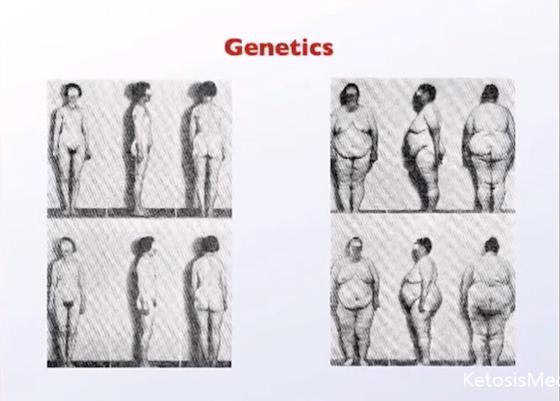Science does have a Solution to Excess Weight
Obesity is Everywhere - The problem is Lack of Knowledge
50% of Americans are overweight, and 30% are obese.

Thin Twins and Fat Twins
Bouchard and Trembay in 1997, demonstrated in a twins study, that your genetic make-up has a considerable influence on how you respond to both food and exercise. This means that weight control for the population needs to be achieved through individualised diets.
![]() The standard recommendation is to eat less on a Low-Fat High-Carbohydrate diet, and exercise more.
The standard recommendation is to eat less on a Low-Fat High-Carbohydrate diet, and exercise more.
One way to do that would be for teams of professionals to work with individuals designing personal diets.
In the meantime, we have to do what we can by educating ourselves. Learn about yourself. Are you slowly becoming carbohydrate intolerant? ![]() Keep a health journal, and conducting some small personal experiments to find our more about yourself.
Keep a health journal, and conducting some small personal experiments to find our more about yourself.
Eating Carbohydrate Forces the Body to Produce Insulin
Understanding what insulin does in your body is critical.
'Insulin vs. Glucagon: The relevance of dietary protein'
Dr. Benjamin Bikman (36 minutes)
Published by: PUBLISHER & Date
Dr. Benjamin Bikman earned his Ph.D. in Bioenergetics and was a postdoctoral fellow with the Duke-National University of Singapore in metabolic disorders. He is currently a professor of pathophysiology and a biomedical scientist at Brigham Young University in Utah.
Dr. Bikman's professional focus as a scientist and professor is to better understand chronic modern-day diseases, with a special emphasis on the origins and consequences of obesity and diabetes, with an increasing scrutiny of the pathogenicity of insulin and insulin resistance. He frequently publishes his research in peer-reviewed journals and presents at international science meetings.
Variation of Carbohydrate Intolerance
Your body adapts to how you choose to behave and to what you eat, and how you eat.
When you are young, you body is carbohydrate tolerant, you can eat sugar and other carbohydrates with abandon and your body will cope with the excesses you subject it too.
As the damage you are doing to yourself accumulates, the body responds by becoming carbohydrate intolerant, it's trying to send you a "STOP" signal.
If you have the early signs of ![]() metabolic syndrome, "STOP." The earlier you respond to that signal the better, because that keeps your dietary options open.
metabolic syndrome, "STOP." The earlier you respond to that signal the better, because that keeps your dietary options open.
Once you have developed ![]() type 2 diabetes, your dietary options are very much restricted.
type 2 diabetes, your dietary options are very much restricted.
All the markers of metabolic syndrome improve if you eat a low-carbohydrate high-fat diet.
Excess Dietary Carbohydrate
When you eat ![]() carbohydrate based foods, or excess amounts of protein, your body will break this down into sugars – eventually all sugars and carbohydrates become glucose in the blood.
carbohydrate based foods, or excess amounts of protein, your body will break this down into sugars – eventually all sugars and carbohydrates become glucose in the blood.
Normally, glucose is needed in the creation of ATP (an energy molecule), which is a fuel that is needed for the daily activities and maintenance inside our bodies.
The modern diet is supermarket based. Food is available every day, there is never a famine. The cheapest food, and the most bulky looking food, is carbohydrate. Hence, we tend to eat every day, and carbohydrates are a substantial part of our diet. Those carbohydrates are quickly converted to glucose, glucose for energy, and glucose for storage, in case there's a famine.
There are two main things that happen to glucose if your body doesn't need it:
Glycogenesis. Excess glucose will be converted to glycogen, and stored in your liver and muscles. Estimates show that only about half of your daily energy can be stored as glycogen. (<2000 kcal)
Lipogenesis. If there's already enough glycogen in your muscles and liver, any extra glucose will be converted into fats and stored using the process called lipogenesis.
When your body has no access to food, like when you are sleeping or when you are on a ![]() ketogenic diet, the body will burn fat and your liver, in a process called beta-oxidation, will create molecules called ketones. We can thank our body's ability to switch metabolic pathways for that.
ketogenic diet, the body will burn fat and your liver, in a process called beta-oxidation, will create molecules called ketones. We can thank our body's ability to switch metabolic pathways for that.
